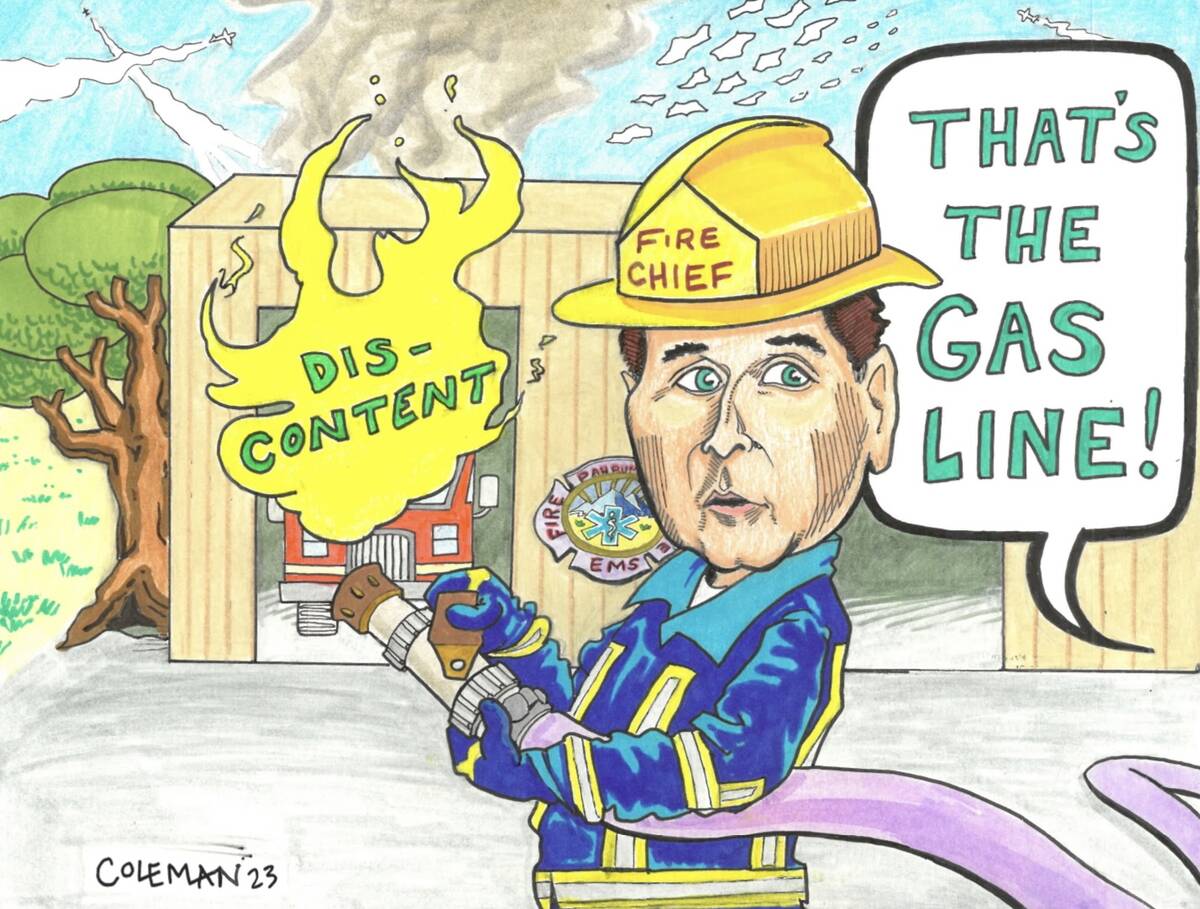TALK OF THE TOWN: Pahrump ‘fired up’ after claims from firefighters unions
Many were fired up after the Pahrump Valley Times published a story earlier this week about a 56-point list of health, safety and mismanagement concerns co-written by members of the local firefighters union that called for Pahrump Fire & Rescue Chief Scott Lewis to step down — or face removal from his position.
Lewis has served more than 20 years with Pahrump Fire & Rescue but Pahrump Valley Firefighters IAFF Local 4068 members this week declared a “state of emergency” within the department, blaming him for high turnover rates among other problems.
Firefighters say their collective cries have gone ignored by local officials for more than a decade.
You can read the union’s full list of grievances on pvtimes.com to understand why members took a second “no confidence” vote on their boss this week and decide for yourself if you think their claims have merit.
But either way, the union’s vote has broader implications for those in our community.
Why you should care
Let’s face it: Safety is a big deal.
And no one wants to fear their life may be jeopardized in a car crash, house fire or other unexpected tragedy because the heroes we call to take care of us in emergencies aren’t being taken care of at the firehouse.
When it comes to working conditions, poor morale can often translate to poor performance — and it seems many of our readers realize this. The stakes are high for our town if emergency response times suffer because of the dark cloud hanging over the department.
Almost immediately after breaking the story about the union’s “beef with the chief” on our website Tuesday, PVT readers reacted on social media.
“If what they’re claiming is true, he needs to go ASAP!” Kurt Godel told us on Facebook.
It was an opinion shared by many of our readers.
Now, to be clear, the “claims” against Lewis haven’t been proven. And while Pahrump Town Manager Tim Sutton issued a statement on Tuesday saying some of the concerns expressed by the union were “legitimate,” he felt they could be more properly addressed during the collective bargaining process.
Collective bargaining is how unions typically negotiate contracts with their employers to define the terms of their employment, including pay, benefits, hours, leave, job health and safety policies, ways to balance work and family and more.
Essentially, collective bargaining is a way to solve workplace problems and could be the best way to raise wages in America, which is suffering from the highest inflation in years partly because salaries haven’t risen with the costs of everything else.
I support collective bargaining because it gives workers a stronger say and provides the chance for them to set boundaries with their boss. If you’re a worker who’s ever felt powerless or abused by a bad boss, you can easily see the benefits of collective bargaining. (And if you’ve never felt powerless or abused at work, you’re likely the bad boss.)
Every year, millions of America’s workers negotiate or renegotiate their bargained contracts through union advances. As PVT reader Gina Meredith pointed out, firefighters unions across the country have been taking “votes of no confidence” in their chiefs for the past two years to force better conditions in their departments.
“Like any side to a story, I’m sure there are some complaints that have merit. But in Scott’s defense, the IAFF Union has been having ‘votes of no confidence’ all over the country the last two years — one in Sparks…” Meredith says. “There’s a lot, so I’m concerned this is more politically motivated than we are led to believe by the union as a whole.”
In March 2022, the firefighters union in Sparks similarly complained about staff shortages within their department. They complained of a number of problems that impacted morale. The Sparks city manager told the Reno Gazette-Journal back then that residents were “safe despite fire crew vacancies.”
Would you believe that?
As you might guess, his remarks did not sit well with Sparks taxpayers who expect a certain level of safety when it comes to fire and rescue services in their town. Many in Sparks have placed the blame on the government officials who essentially allocate funding for their first-responders.
And that’s who PVT reader Lynn Wesley says we should blame here in Pahrump.
“My beef isn’t with [Chief Scott Lewis], who I don’t know — it’s with the county,” Wesley says. “In addition to being the fire chief in Pahrump, I understand he’s also the director of emergency services for the entire county. With the high activity levels in Pahrump, how can he adequately address what’s happening in the rest of the county? He should hold either one position or the other, but NOT BOTH.”
Pahrump Valley Fire & Rescue responds to more than 10,000 service calls annually. Its first-responders are often stretched thin to cover the 360 square miles in our sprawling dust bowl that’s occasionaly ripe for fires, gun violence and medical emergencies.
As Pahrump edges toward a population of 50,000, emergency funding and staffing here just hasn’t kept pace. Voters seem resistant to grow the local government — and pay more taxes — to improve services because we’re often not impressed by the results of our local government, but some say that’s what is needed.
“This is what happens in an unincorporated town,” says Cathy Mineck, “In an incorporated town, concerns are heard, and things are changed. No one should be in a position of feeling like their life means nothing. How many firehouses do you have? There needs to be one in every quadrant of the town. It takes a long time to get across the valley. Those minutes spent driving to the scene are possibly someone living or dying.”
Some in Pahrump say the firefighters union was forced to take action because our government officials failed to do so for years.
Cassidy McNally told us on Facebook that the situation scares her.
“I used to be against unions because I grew up in a town where they rarely existed and didn’t completely understand them, and in most places management had their way with everyone and ran things dangerously cheap,” she says. “In towns like this, unions seem to be very resourceful because everyone behind the curtain in all the fancy board meetings has their own hidden agenda and everything revolves around who’s allowed in the good ol’ boys club and nobody is their thinking of the little guy except for the unions who are there to protect their rights. Here, something clearly went wrong because this list mostly shows the union is protecting their safety.”
Shame on this cheap mismanaged town, McNally added.
But there’s a silver-lining: Pahrump’s town manager thinks there’s hope for a productive collective bargaining session with the firefighters union — and I agree.
However, the first step to solving any problem is admitting that there might be a problem.

Contact Editor Brent Schanding @pvtimes.com











